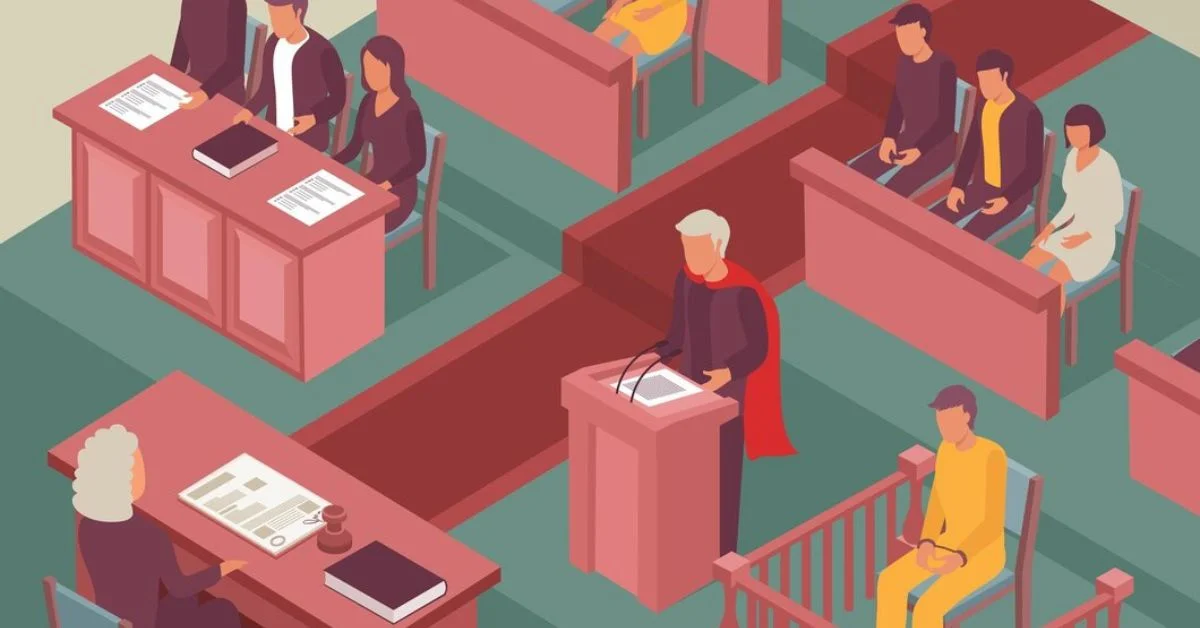LAW
Learning the Appeals Process in Civil and Military Courts

Table of Contents:
- Appeals in Civilian Courts
- Initiating an Appeal: Steps and Requirements
- Critical Differences in Trial vs. Appellate Courts
- The Unique Nature of Military Court Appeals
- Navigating the Differences: Civilian vs. Military Appeals
- The Role of Legal Representation in Appeals
- Choosing the Right Appeal Attorney
- The Influence of Precedent and Case Law
- Public Perceptions of the Appeals System
- Policy Reforms and the Future of Appeals
Key Takeaways:
- An appeals process exists to allow for the review of a court’s decision.
- The Uniform Code of Military Justice (UCMJ) governs the appeals process in military courts.
- Legal representation and understanding of precedent are crucial in appeals.
Appeals in Civilian Courts
The process of appealing a civilian court decision involves several specific steps. It starts with the timely filing of a notice of appeal, a legal document informing the system of the appellant’s intention to ask a higher court to review the decision. In contrast to trial courts, where witnesses and evidence are presented, appellate courts are where legal arguments are made. These arguments focus on the interpretation of the law and its application in previous cases. The success of an appeal hinges on presenting vital legal points and persuading the court that a legal error impacted the trial outcome.
Initiating an Appeal: Steps and Requirements
Preparing a brief is a crucial step in the appeals process for appellants. This document plays a vital role, and it must be prepared meticulously. For veterans transitioning to civilian life, the court of appeals for veterans claims types of cases can be challenging and overwhelming. A clear understanding of the process and a thoughtful approach are essential.
The brief presents the appellant’s legal arguments, which rely heavily on precedents and statutory interpretation to make a strong case. Once the appellant submits their brief, the appellee responds with a brief that counters their claims. The appellee’s brief often emphasizes the notion of judicial deference, which means that the court should give weight to the lower court’s decisions.
Critical Differences in Trial vs. Appellate Courts
A significant distinction between appellate and trial courts is their approach to conflict resolution. The latter focuses on determining the facts, while the former reviews the legal processes and principles applied to those facts. The challenge is that, in most cases, appellate courts accept the trial court’s factual findings, leaving only the legal conclusions open for dispute.
The Unique Nature of Military Court Appeals
The military justice system houses an internal appeals hierarchy tailored to address the distinctive context of military law. Military members are held to the Uniform Code of Military Justice (UCMJ) standards, a legal code that emphasizes the importance of discipline, order, and fairness. Appeals within this system still aim to rectify legal errors but often involve high-stakes decisions affecting military careers and personnel rights.
Navigating the Differences: Civilian vs. Military Appeals
Understanding the dichotomy between civilian and military appeals is critical, particularly for individuals transitioning from service to civilian life. The military’s appellate landscape is specialized and designed for a community conditioned by hierarchy and duty. At the same time, the civilian system is predicated on broader principles of justice applicable to society at large. Differences in procedural jargon, review standards, and even available legal remedies underscore the necessity for adaptation and savvy maneuvering for those accustomed to military protocols.
The Role of Legal Representation in Appeals
Legal counsel plays a defining role in the appellate process. A seasoned attorney’s expertise and strategic acumen can mean the difference between success and failure. Lawyers with an in-depth underpinning in appeals can navigate complex legal waters, discerning the most substantial arguments to shift an appellate court’s opinion. Especially when dealing with a system as specialized as military appeals, the counsel of someone well-versed in military law is indispensable.
Choosing the Right Appeal Attorney
Selecting an attorney with a robust track record in appellate success is not an extravagance but a necessity, particularly given the specificity and intricacy of appellate advocacy. Prospective appellants should seek attorneys whose expertise aligns with the nuances of their case, privileging those who demonstrate rigor in legal research, brief writing, and oral argumentation.
The Influence of Precedent and Case Law
Appeals do not exist in a vacuum—instead, they draw heavily from the vast repository of case law. Appellate courts look to prior decisions as signposts, guiding their interpretation of the law. This respect for precedent, known as stare decisis, ensures consistency across the legal spectrum so that cases are decided alike. It is a cornerstone of civilian and military law and can be a powerful ally for appellants who skillfully harness its authority.
Public Perceptions of the Appeals System
In the court of public opinion, the perception of the appeals system is often influenced by headline-grabbing legal sagas. However, with such sensationalism comes the risk of misinformation, which can skew understanding of the appellate process and its outcomes. Hence, it is imperative to demystify the appeals system, providing clarifications and context to foster an informed citizenry that respects and understands the justice mechanisms.
Policy Reforms and the Future of Appeals
The legal arena is not static, and the evolution of appellate law proves this. Reforms are regularly proposed, debated, and sometimes enacted to address the emerging needs of a dynamic society. Looking ahead, we anticipate ongoing efforts to balance the competing demands of efficiency and thorough legal analysis while also ensuring that justice remains accessible to all, regardless of their wealth, status, or background.
LAW
When Does Your Business Need A Corporate Labor Lawyer?

The legal landscape of employment law is always changing. As an employer, it is almost inevitable that you will ask yourself at some point: “Do I need a corporate labor lawyer?” Many companies still do not have one due to costs. It may be true that it would be impractical to hire a lawyer for every small uncertainty. However, you will surely need this figure to effectively handle certain situations.
When to Hire A Business Labor Lawyer?
It is not always easy to determine when you need an employment lawyer. Therefore, it is advisable to go to one in case of doubts. Your fees for a consultation are going to be lower than what could result from poor practice. There are many situations in which you should hire them. Below, we tell you some of the most important ones.
Fire an Employee
Firing an employee should be done after careful consideration and after seeking advice from a business employment attorney. Even when dismissal occurs for disciplinary reasons, you must cover all the bases.
Employment law can be complex and you need to make sure things like applying the same sanctions to all employees if their action is the same. If you don’t, you can be sued for discrimination. These are some situations in which you should consider asking an attorney to review your decision to terminate:
- The worker has a written or oral employment contract that limits his or her right to dismissal.
- The employee has benefits, stock options, or retirement money that will be awarded to him or her shortly.
- The worker recently filed a complaint or grievance with a government agency or complained to you about illegal or unethical activities in the workplace.
- The employee recently filed a complaint of discrimination or harassment.
- The employee recently disclosed that he is in a protected class, for example, a pregnancy.
- The worker has access to the company’s high-level trade secrets or competitive information.
- The employee denies committing the acts for which you are firing him, even after an investigation.
- The employee has hired an attorney to represent him or her.
Review Contracts, Agreements, Manuals And Policies
A business employment lawyer can review your employment contracts and agreements to ensure that all information is legal. You must analyze its application in a court, the necessary terms, and their tax burdens.
Similar to contracts and agreements, the information contained in your manual and policies has legal implications for the business. Freeman LovellP LLC can help you be sure about issues such as pay for sick leave, overtime, doubts about schedules, health and safety in the company, etc.
Dealing with a Government Agency
If your company is visited by someone from a government agency, your first action should be to contact a business employment lawyer.
Initial contact with government agencies is crucial. You need to make sure you take all the right steps to protect your business. Even if you have carried out your activities legally, you need to defend your interests by seeking advice on what a government agent can and cannot demand of you.
Legal documents of an Employee
Most employers will immediately seek the services of a business employment lawyer if they are sued by an employee. However, there may be some who believe that they are equipped to handle this situation on their own. But, for example, do you know all the null dismissal clauses?
All communication should pass from our Freeman Lovell, PLLC attorney to the employee. Do not try to contact the worker to reason, since any conversation without the presence of lawyers can cause problems. Instead of focusing on trying to dissuade your employee from continuing to take legal action, spend time working with your attorney to file a legal response to the lawsuit.
When You Are Going To Try Something New
Many cases can be included here. Some examples are if you are going to test a new piece of technology, use an analysis tool, change your structure, or implement a new policy. Any minimal change will be related to some law. Therefore, it is recommended that they be supervised by a corporate labor lawyer. They can point out problems with the proposal and give some necessary guidelines that will reduce risks.
When You Need To Do An Investigation Or Audit
If you have to look under your practices or have filed a complaint, it is advisable to contact a business employment lawyer. They are trained to test compliance and investigate possible wrongdoing.
How To Hire A Company Labor Lawyer
You already know many cases in which you will need the help of a business labor lawyer. Possibly you are already convinced of how important it is for your business to have one of these professionals. But how to find the best ones? This process is not always a simple task.
In it, you will only have to answer a few brief questions, such as where you are looking and what you need, and the platform will offer you several results near you. In addition, through it, you can carry out negotiations with different lawyers. That way, you will know in advance how they can help you, rates, and more. There is no better way to find the ideal corporate labor lawyer for you!
LAW
How Can Springfield’s Premier Law Firm Assist in Your Personal Injury Claim?

Suffering a personal injury can lead to a chaotic period filled with uncertainty, stress, and financial strain. Whether due to an automobile accident, a slip and fall, or any other form of injury, navigating the aftermath requires more than medical attention—it demands legal expertise.
In Springfield, the premier law firm stands ready to assist victims through the complex process of filing and winning a personal injury claim. But what exactly can you expect from top legal representation in Springfield? This article talks about how Springfield’s premier law firm can significantly impact your personal injury claim.
Expertise and Experience of a Springfield Personal Injury Law Firm
The journey toward receiving fair compensation for your injuries starts with the right legal team. A Springfield personal injury law firm brings expertise and experience tailored to personal injury law. These professionals understand the nuances of the legal system in Springfield, ensuring your case is handled with the attention to detail it deserves.
From the moment you initiate your claim, the firm’s seasoned attorneys begin crafting a strategy that aligns with the specifics of your case. They’re adept at gathering necessary evidence, from medical reports to eyewitness accounts, ensuring every aspect of your injury and its impact on your life is meticulously documented and presented.
Comprehensive Case Evaluation
Every personal injury case is unique, with its circumstances and challenges. Springfield’s premier law firm excels in providing a comprehensive case evaluation, ensuring no stone is left unturned. This initial assessment is critical, as it lays the groundwork for your claim, identifying the liable parties and the extent of their responsibility.
This thorough evaluation not only helps build a robust case but also sets realistic expectations for compensation. By understanding the intricacies of your case from the outset, your legal team can better navigate the path to a successful outcome.
Navigating Insurance Negotiations
Dealing with insurance companies can be one of the most daunting aspects of a personal injury claim. Springfield’s premier law firm has extensive experience negotiating with insurers, ensuring that their clients are not shortchanged. Their lawyers know how to communicate effectively with insurance adjusters and present evidence in a manner that maximizes the value of your claim.
Their goal is to ensure you receive a fair settlement that covers not just your immediate medical expenses but also long-term care, lost wages, and compensation for pain and suffering. They’re prepared to take the fight to court if negotiations stall, advocating vigorously on your behalf.
Personalized Legal Strategy
A cookie-cutter approach doesn’t cut it when it comes to personal injury claims. Springfield’s top legal firm understands the importance of a personalized legal strategy tailored to the specifics of your case. They consider all variables, from the severity of your injuries to the impact on your quality of life, crafting a legal plan that targets the maximum compensation possible.
This tailored approach extends to how they communicate with you, ensuring you’re kept in the loop at every step. Their commitment to transparency means you’ll never be left wondering about the status of your case.
Access to Top-Tier Resources
Having access to top-tier resources can be a game-changer in building your case. Springfield’s premier law firm maintains a network of medical professionals, accident reconstruction experts, and financial analysts who can provide critical insights and testimonies for your claim. These resources can bolster your case, providing the evidence needed to argue for the compensation you deserve convincingly.
Additionally, the firm’s investment in the latest legal technologies ensures that your case is managed efficiently, from document handling to evidence presentation. This combination of expert resources and technology streamlines the legal process, allowing for a focus on winning your claim.
Advocacy and Representation in Court
While many personal injury claims are settled out of court, some require litigation to achieve a fair outcome. Springfield’s premier law firm is ready to represent you in court, bringing their litigation expertise to bear. Their attorneys are skilled trial lawyers, prepared to present your case convincingly before a judge and jury.
This readiness to go to court demonstrates their commitment to securing your best possible outcome. It also serves as a deterrent to insurers and opposing parties who might otherwise be tempted to offer less than you deserve, knowing that your legal team is prepared for battle. In the wake of a personal injury, consulting with Springfield’s premier law firm is not just a wise decision—it’s an essential step toward safeguarding your future. With their expertise, experience, and dedication, you can confidently navigate the legal process, focusing on your recovery while they fight for the compensation you deserve.
LAW
Streamlining Justice: Enhancing Due Process

In the realm of justice, the concept of due process stands as a cornerstone of fairness and equity. Ensuring that every individual has the right to a fair trial and legal protection is fundamental to a just society. However, as the complexities of legal cases grow and the volume of disputes increases, the need for streamlined processes within the legal system becomes ever more apparent.
The Importance of Due Process
Before delving into the ways in which due process can be enhanced through streamlining, it’s crucial to understand the significance of due process itself.
Due process is the principle that ensures individuals are treated fairly by the legal system. It guarantees that everyone has the right to notice and a hearing before the government can take away their life, liberty, or property. This procedural safeguard is enshrined in the constitutions of many countries and is considered a fundamental human right.
Challenges in the Current Legal Landscape
Despite the noble principles underlying due process, the current legal landscape is fraught with challenges that can impede its effective implementation. Some of the key challenges include:
- Backlogs and Delays: Overburdened court dockets often lead to significant delays in the resolution of cases, denying individuals timely access to justice.
- Complex Procedures: Legal processes are often convoluted and difficult to navigate, especially for those without legal expertise, creating barriers to effective representation.
- Resource Constraints: Limited resources, both in terms of funding and manpower, can strain the efficiency of legal systems, hampering the timely delivery of justice.
Enhancing Due Process Through Streamlining
To address these challenges and enhance due process, various strategies can be employed to streamline legal procedures:
- Digitalization and Automation: Embracing technology to digitize court processes, automate routine tasks, and enable online filings can significantly reduce paperwork, increase efficiency, and expedite case resolutions.
- Alternative Dispute Resolution: Implementing mechanisms such as mediation and arbitration can help resolve disputes outside of traditional court settings, easing the burden on overloaded court systems and providing quicker resolutions for parties involved.
- Simplified Legal Language: Making legal documents and procedures more accessible through plain language can empower individuals to understand their rights and obligations better, promoting transparency and reducing confusion.
- Case Management Systems: Utilizing case management software can streamline document management, scheduling, and communication among legal professionals, enabling seamless collaboration and efficient case handling.
The Role of a Criminal Justice Lawyer in Streamlining Justice
A criminal justice lawyer in Utah plays a pivotal role in streamlining the justice process, directly impacting the efficacy of enhancing due process. These legal professionals are at the forefront of navigating the state’s complex legal system, advocating for the rights of individuals and ensuring that the principles of fairness and equity are upheld. Their expertise in the intricacies of criminal law and profound understanding of procedural nuances enable them to effectively minimize delays and overcome the challenges posed by backlogs and complex procedures.
By leveraging their knowledge and skills, a criminal justice lawyer in Utah can significantly contribute to the implementation of strategies aimed at streamlining legal processes, from advocating for the digitalization and automation of court systems to supporting the use of alternative dispute resolution mechanisms. Their commitment to justice and proficiency in the legal landscape are essential in the quest to enhance due process, making their role indispensable in the pursuit of an efficient and equitable justice system.
As we navigate an increasingly complex and interconnected world, the need to streamline legal processes and enhance due process becomes paramount. By leveraging technology, fostering innovation, and prioritizing efficiency, we can pave the way for a more accessible, transparent, and equitable legal system for all.
In conclusion, streamlining justice is not just about expediting procedures; it’s about upholding the principles of due process and ensuring that justice is swift, fair, and accessible to all. By embracing innovation and reimagining traditional legal approaches, we can forge a path towards a more just society where rights are protected, disputes are resolved efficiently, and due process is truly enhanced.

 TECHNOLOGY4 months ago
TECHNOLOGY4 months agoBlog Arcy Art: Where Architecture Meets Art

 ENTERTAINMENT1 week ago
ENTERTAINMENT1 week agoExploring the Kristen Archives: A Treasure Trove of Erotica and More

 LIFESTYLE1 week ago
LIFESTYLE1 week agoWho Is Sandra Orlow?

 ENTERTAINMENT4 days ago
ENTERTAINMENT4 days agoKiss KH: The Streaming Platform Redefining Digital Engagement and Cultural Currents

 LIFESTYLE4 months ago
LIFESTYLE4 months agoThe Disciplinary Wives Club: Spanking for Love, Not Punishment

 GENERAL4 months ago
GENERAL4 months agoWhat are stories of male chastity? A Comprehensive Guide

 EDUCATION4 days ago
EDUCATION4 days agoLingrohub Platform: A Complete Student Access Guide

 ENTERTAINMENT4 weeks ago
ENTERTAINMENT4 weeks agoMonkeyGG2: Your Personal Gaming Hub











